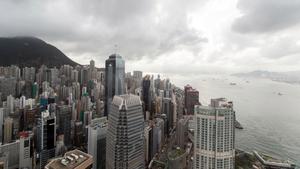 Many families have to put up with substandard living conditions while waiting for their turn for public housing. (ROY LIU / CHINA DAILY)
Many families have to put up with substandard living conditions while waiting for their turn for public housing. (ROY LIU / CHINA DAILY)
The UN’s World Happiness Report 2019, published in March, ranks Hong Kong at No 76, down five places from a year before, of the 156 territories surveyed. The annual report is based on sample surveys of how happy citizens in each place perceive themselves to be.
Ranking among the middle of the pack is no consolation for a city that enjoys widely admired social and economic advantages that help secure its place as an international financial center and business hub in the world’s fastest-growing region. Its excellent infrastructure facilities and a solid economic growth record, coupled with years of virtual full employment, apparently have failed to put a smile on many people’s faces.
For Hong Kong people, the result of the UN happiness survey may not be such a big surprise. Hidden behind the facade of a glamorous metropolis is a tattered social fabric torn by a widening income inequality between the minority rich and the rest of the people; worsening poverty, with a record 1.3 million citizens falling below the poverty line; and a healthcare system stretched to the limit by a rapidly aging population.
Further fueling social discontent is the escalating cost of housing, making Hong Kong one of the most expensive cities to live in. To be sure, about 50 percent of the families live in subsidized housing provided by the government. But many families have to put up with substandard living conditions while waiting for their turn for public housing. That wait has lengthened to five years or more from three.
The government apparently believes that solving the housing shortage problem would go a long way in making people happier. Its ambitious plan, including the building of a multibillion-dollar man-made island, has yet to put people’s hearts at ease.
Some social analysts put forward the theory that the escalating housing cost has been a major factor in eroding public trust in the government. That loss of trust, they argued, was a source of rising public discontent that made Hong Kong people less happy than those in some underdeveloped economies, according to the UN survey.
The government is right in identifying the housing shortage as the culprit that sours the public mood. To change that, it will need to offer some quick fix that is seen to be effective, in addition to the long-term plans that will take years to produce results.


